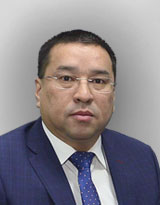БІЛІМ БЕРУДІ НЕ КҮРДЕЛЕНДІРЕДІ?
Аңдатпа
Әдебиет тізімі
1. Buck, P.W., Bradley, J., Robb, L., &Kirzner, R. Sh. (2012). Complex and Competing Demandsin Field Education: A Qualitative Study of Field Directors’ Experiences. Field educator, 2, 117.
2. Braun, E. (2010). Knowledge power: interdisciplinary education for a complex world. Prometheus, 28(3), 288-291.
3. Cetin, F. (2016). Determination of Value Education Self-Efficacy Beliefs of Prospective Teachers. International Online Journal of Educational Sciences, 8(4),88-96.
4. Capel, S.,Leask, M.,& Turner, T. (2013) (6 ed).Learning to teach in the Secondary school.A companion to school experience. Great Britain: Routledge.
5. Chappell, T. (2012). Varieties of Knowledge in Plato and Aristotle. Topoi, 31(2), 175-190.
6. Chen, C. H. (2008). Why do teachers not practice what they believe regarding technology integration?. The Journal of Educational Research, 102(1), 65-75.
7. Curren, R. (2007). Philosophy of Education. Oxford. Blackwell Publishing Ltd.
8. Drago-Severson, E. (2016). Teaching, learning and leading in today’s complex world:reaching new heights with a developmental approach. International Journal of Leadership in Education, 19(1), 56-86.
9. Dalton, B., Stevens, L., & Maas-Brady, J. (2011). “How do you do it?”: MSW Field Director Survey. Advances in Social Work, 12(2), 276-288.
10. Dumitrescu, C. A. (2010). Essence of Aristotel's Well-Governing Concept, Part Three: The Moral Dimension. Cogito: Multidisciplinary Res. J., 2, 157.
11. Guevara, P. (2014). Toward a Common Structure in Demographic Educational Modeling and Simulation: A Complex Systems Approach. Complicity: An International Journal Of Complexity & Education, 11(2), 86-101.
12. Herbst, M., &Strawinski, P. (2016). Early effects of an early start: Evidence from lowering the school starting age in Poland. Journal of Policy Modeling, 38(2), 256-271.
13. 'I can say that an uneducated girl is worthless'. (2014, May 9). The Guardian. London.
14. Jacobson, M. J., &Wilensky, U. (2006). Complex systems in education: Scientific and educational importance and implications for the learning sciences. The Journal of the learning sciences, 15(1), 11-34.
15. Kereluik, K., Mishra, P., Fahnoe, C., & Terry, L. (2013). What knowledge is of most worth: Teacher knowledge for 21st century learning. Journal of Digital Learning in Teacher Education, 29(4), 127-140.
16. Machekhina, O. N. (2016, January). Globalization of education: the experience of retrospective complex analysis. In SHS Web of Conferences (Vol. EDP Sciences. Mulgrew, M. (2013, February 28). The complex job of teaching. New York Teacher.
17. Nicolaides, A., &Marsick, V. J. (2016). Understanding Adult Learning in the Midst of ComplexSocial “Liquid Modernity”. New Directions for Adult and Continuing Education, 2016(149), 920.
18. Phillips, D.C. (Ed). (2014). Encyclopedia of educational theory and philosophy. SagePublications.
19. RSA, (n.d.). Opening-minds-education-for-the-21st-century.
20. Schmoker, M. (2014, January 14). Why Make Reform So Complicated?
21. Semel, S. F. (Ed.). (2010). Foundations of education: The essential texts. Routledge.
22. Ucar, X. (2013). Exploring different perspectives of Social Pedagogy: towards a complex and integrated approach. Education Policy Analysis Archives, 21(36), n36.
23. Utyupova, G.Y., Baiseitova, Z.B., & Mukhamadiyeva, A.A. (2016). Value Forming Education of Prospective Primary School Teachers in Kazakhstan and Germany. International Journal of Environmental and Science Education, 11(9), 2607-2618.
24. Young, M., & Muller, J. (2010). Three Educational Scenarios for the Future: lessons from the sociology of knowledge. European Journal of Education, 45(1), 11-27.
Рецензия
Дәйектеу үшін:
БІЛІМ БЕРУДІ НЕ КҮРДЕЛЕНДІРЕДІ? Х.Досмұхамедов атындағы Атырау университетінің Хабаршысы. 2020;57(2):6-14.
For citation:
Zhumabayeva E. WHAT MAKES EDUCATION SO COMPLEX. Bulletin of the Khalel Dosmukhamedov Atyrau University. 2020;57(2):6-14.












